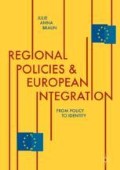Abstract
With nearly all EU regions participating in European regional networks as part of their European policy, it becomes vital to conduct an evidence-based assessment on whether networks cultivate a European identity through their work. This chapter presents a case study on ERRIN, a European regional network. It will help understand whether networks have the ability to mitigate circumstances when national and / or regional governments are Eurosceptic and nevertheless foster European cooperation and identity building. By providing a review of the network as well as presenting the findings from 13 semi-structured interviews with network members, it will be determined to which extent European networks can facilitate cooperation and integration and support the emergence of European identity.
References
Books and Articles
Fligstein, N. (2008). Euroclash – The EU, European Identity, and the Future of Europe. Oxford: Oxford University Press.
Gänzle, S., & Kern, K. (Eds.). (2016). A “Macro-Regional” Europe in the Making – Theoretical Approaches and Empirical Evidence. London: Palgrave Macmillan.
Author information
Authors and Affiliations
Rights and permissions
Copyright information
© 2018 The Author(s)
About this chapter
Cite this chapter
Braun, J.A. (2018). European Regional Networks: Enhancing European Engagement and Identity Building?. In: Regional Policies and European Integration . Palgrave Macmillan, Cham. https://doi.org/10.1007/978-3-319-67762-0_6
Download citation
DOI: https://doi.org/10.1007/978-3-319-67762-0_6
Published:
Publisher Name: Palgrave Macmillan, Cham
Print ISBN: 978-3-319-67761-3
Online ISBN: 978-3-319-67762-0
eBook Packages: Political Science and International StudiesPolitical Science and International Studies (R0)

